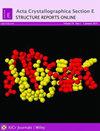4-bromo-N-(2-hydroxy-phen-yl)benzamide 的晶体结构。
IF 0.9
Acta crystallographica. Section E, Structure reports online
Pub Date : 2014-11-15
eCollection Date: 2014-12-01
DOI:10.1107/S1600536814024696
引用次数: 0
摘要
在标题化合物 C13H10BrNO2 中,中心酰胺 C-N-C(=O)-C 片段的非 H 原子的平均平面(r.m.s. 偏差 = 0.004 Å)与羟基取代的苯环形成 73.97 (12)° 的二面角,与溴代苯环形成 25.42 (19)° 的二面角。两个芳香环相互倾斜 80.7 (2)°。在晶体中,分子通过 O-H⋯O 和 N-H⋯O 氢键连接,沿着 [010] 形成链。这些链通过微弱的 C-H⋯O 氢键连接,形成平行于 (100) 的薄片,并包围着 R (3) 3(17) 和 R (3) 2(9) 环图案。本文章由计算机程序翻译,如有差异,请以英文原文为准。



Crystal structure of 4-bromo-N-(2-hydroxy-phen-yl)benzamide.
In the title compound, C13H10BrNO2, the mean plane of the non-H atoms of the central amide C-N-C(=O)-C fragment (r.m.s. deviation = 0.004 Å) forms a dihedral angle of 73.97 (12)° with the hy-droxy-substituted benzene ring and 25.42 (19)° with the bromo-substituted benzene ring. The two aromatic rings are inclined to one another by 80.7 (2)°. In the crystal, mol-ecules are linked by O-H⋯O and N-H⋯O hydrogen bonds, forming chains along [010]. The chains are linked by weak C-H⋯O hydrogen bonds, forming sheets parallel to (100), and enclosing R (3) 3(17) and R (3) 2(9) ring motifs.
求助全文
通过发布文献求助,成功后即可免费获取论文全文。
去求助
来源期刊
自引率
33.30%
发文量
0
审稿时长
1.3 months
期刊介绍:
Acta Crystallographica Section E: Structure Reports Online is the IUCr highly popular open-access structural journal. It provides a simple and easily accessible publication mechanism for the growing number of inorganic, metal-organic and organic crystal structure determinations. The electronic submission, validation, refereeing and publication facilities of the journal ensure very rapid and high-quality publication, whilst key indicators and validation reports provide measures of structural reliability. In 2009, the journal published over 4000 structures. The average publication time is less than one month.

 求助内容:
求助内容: 应助结果提醒方式:
应助结果提醒方式:


